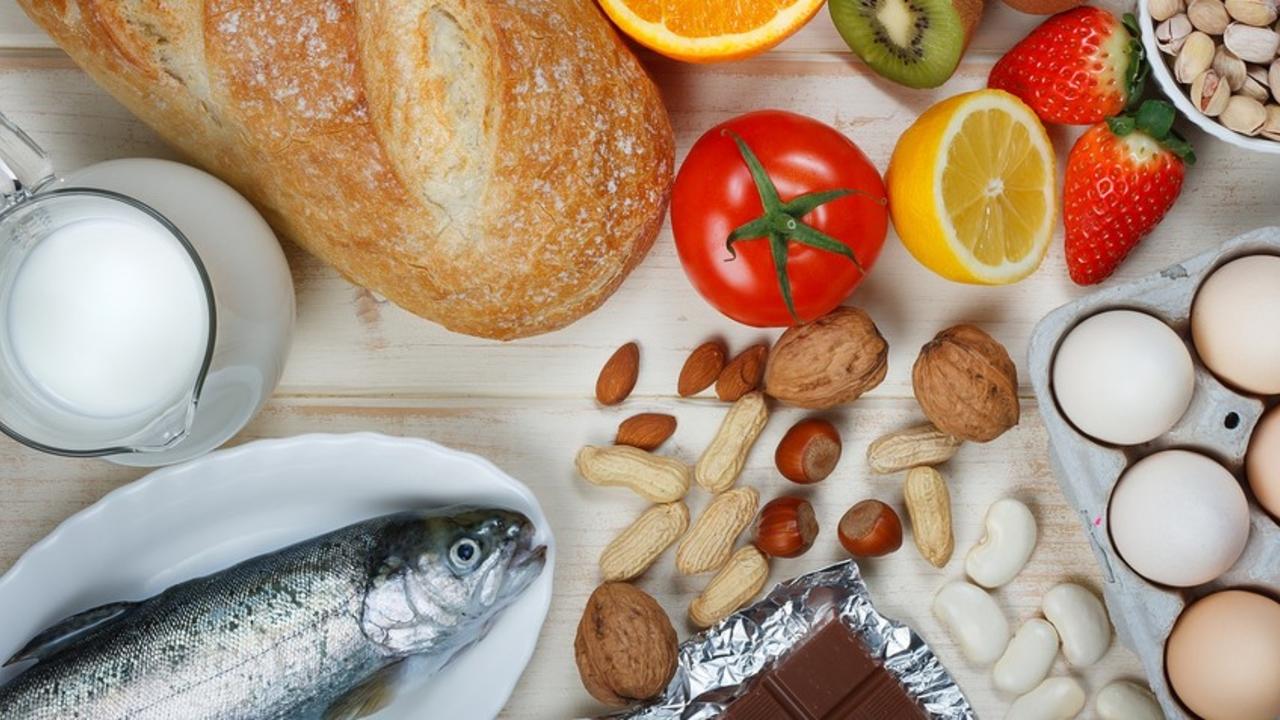Menopause and Food Sensitivities- It’s Not Just Your Changing Hormones
Jul 05, 2018
Food sensitivities often come to rear their nasty heads as you approach the menopause.
Even if you’ve happily eaten a certain food hundreds of times before, these days you only have to look at it and you find yourself struggling with indigestion, bloating, nausea, constipation, itchy skin, headaches, a cough or runny nose, hives, IBS, stomach ache or excess gas.
It can be incredibly uncomfortable, not to mention frustrating.
And if that wasn’t enough, your food intolerance or sensitivity also worsens your hot flushes and leaves you feeling completely and utterly rubbish. It’s not much fun at all.
So let me help you do something about it.
Follow me as I explain why you’re much more likely to suffer with food sensitivities during the menopausal years, what the usual food sensitivity triggers are and why these foods trigger a reaction.
Then I’ll share with you a six-step plan that will help you ease those digestive issues, balance your hormones and feel like a brand new you.
Why are you much more likely to suffer from food sensitivities during the peri-menopause and menopause?
I know…
You already have so much to cope with as you transition through the menopause. Food sensitivities on top of that seem so unfair, don’t they?
So let me reassure you that food sensitivities aren’t directly caused by the peri-menopause or menopause. You’ve probably always had issues with these foods, yet the changes of the menopause is causing you extra problems.
This includes the following:
1) Your changing hormone levels slow your food’s transition through your digestive tract.
2) Your liver function suffers because of the extra load and affects food transit time too (triggers more digestive issues)
3) Changes in your oestrogen levels can affect your stomach acid and prevent you digesting your food properly.
4) Any drop in oestrogen impacts your immune system, increasing the chance of suffering from food sensitivities.
5) Stress associated with ‘the change’ can also affect your digestion, impact your immune system and lead to potential food sensitivities.
Because of these factors, I’d say that any menopausal woman not suffering from some degree of digestive changes is doing very well indeed!

What are the most common triggers of food sensitivities?
Anything you eat could potentially trigger a food sensitivity, although there are some foods and food chemicals which cause greater digestive problems.
These include:
- Milk and dairy products
- Wheat, grains and gluten
- Peanuts, peanut butter and tree nuts like almonds and walnuts
- Eggs
- Sugar
- Artificial sweeteners
- Corn, corn products, high fructose corn syrup
- Soya and soya products
- Yeast, yeast extract and Brewer’s Yeast
- Fish and shellfish
- Additives, preservatives, food colours and dyes
- Nitrates, sulfites and MSG
Why do these foods trigger a reaction?
One of the most common causes of food sensitivities is the lack of an essential digestive enzyme which is necessary to digest that food. If you don’t have enough of this enzyme, then the food you’ve eaten will stay in your bowel, ferment and could cause a great deal of bloating and discomfort, trapped gas and other issues. This is usually the case with foods containing lactose, found in milk.
Some people are more sensitive to the chemicals found in certain foods, or those which are formed when they eat certain foods. This is true when it comes to foods like fruits and vegetables, spices, herbs and most processed foods which contain salicylates- the defence mechanism in plants which protects them from harm. Many people are highly sensitive to these salicylates.
Processed foods can also trigger problems for people because of the nitrates, sulphites and monosodium glutamate which they contain.
But again, anything could potentially trigger your food sensitivities, which is why it’s so important to keep a close eye on what you’re eating, and take some steps towards easing the problem.

6 easy steps to ease your food sensitivities naturally
Here are six easy steps that will help you ease your food sensitivities and ease your digestive issues fast.
Best of all, it won’t just be your digestive health that will get a boost- you’ll also see improvements in your peri-menopause or menopause symptoms, you’ll sleep better at night and you’ll start feeling like your younger, healthier self again.
Here are the six steps.
STEP #1: Identify and ditch potential food allergens
Obviously, firstly you need to work out what exactly is triggering your food sensitivities so you can do something about it.
Usually, this is as simple as keeping a close eye on your diet and noting when you start suffering from symptoms.
Then you can just eliminate the culprit food and immediately feel better.
However, at times it’s not quite that simple. As you’ve seen earlier on in this blog, there are many things which could be affecting your body and causing you to break out in those hives, suffer from those headaches, battle IBS and so on.
That’s why I’d also recommend that you avoid certain foods which are most likely to be triggering your food sensitivities as well as negatively impacting your overall health. These include alcohol, processed fatty foods, sugary foods, toxins such as pesticides and junk food. You could go one step further and avoid gluten if you think this could be a trigger for you too.
Instead, eat as much organic produce as possible, drink plenty of water and consider growing your own veggies at home. Some foods are so easy to grow and taste even better (and are more nutritious) when you can pick them right off the plant and enjoy them straight away.
STEP #2: Boost your healthy gut bacteria
Now that you’re started putting the most nutritious and delicious food into your body, you can start focusing on healing your digestive system. As you might know, this part of your body needs to be in tip-top shape in order for you to feel healthy, energetic and glow with health. If your digestive system isn’t healthy then neither are you!
This means getting the optimal amount of healthy bacteria into your gut so you can digest your food properly, absorb all the vitamins and minerals that your body needs, eliminate any excess oestrogen from your body and also have a stronger, healthier immune system.
It’s a win-win situation. :)
Once you get enough of this bacteria, you’ll also notice that your digestive issues, itchy skin and even hot flushes will improve.
I always prefer a whole-food approach to healing. So instead of heading to your local health food store and loading up on acidophilus , why not eat the best healthy bacteria boosting foods available first and see if it helps. I recommend natural prebiotic foods like Kimchi, Sauerkraut, Miso soup, Tempeh and Kefir.
STEP #3: Support your liver
Your liver plays an important part in the detoxification of your body by eliminating excess oestrogen, toxins, chemicals, caffeine, drugs, alcohol, and so on. When it’s not working optimally, you’re far more likely to suffer food sensitivities, oestrogen dominance and notice your menopausal symptoms becoming even worse. There are various ways you can do this.
First I’d recommend you drink raw vegetable juices such as cabbage, celery, cucumber, beetroot and green leafy veggies.
Secondly, include as many cleansing foods in your diet as you can.
Thirdly, it could be worth supplementing with DIM, Milk Thistle or B-complex vitamins to support your overall liver health.
STEP#4: Move your body
If you want a healthy digestive system, you’re also going to have to get moving. This will give and a nice boost to your digestive system and help speed your food’s transition through your gut, therefore reducing the chances that you’ll suffer from those food sensitivities.
Start by going for a walk every day, preferably in the early morning sunshine and for 30 minutes. It will get your blood pumping, help regulate your hormone production, reduce your stress levels and get you sleeping better at night.
Also, aim to do three 20-minute HIIT exercise sessions every week and also include any exercise you really enjoy for best results.
STEP #5: Practice mindful eating
Your entire digestive system needs you to break down your food properly in your mouth by chewing and mixing it with saliva before swallowing. Then it can get to work extracting the nutrients, sending them out to keep your body healthy and eliminating the waste.
But we often tend to grab something on the go and stuff it down in the few minutes we have before we head to the next appointment. We barely have time to eat, let alone chew endlessly!
Which is why I’d highly advise you to become more mindful about your eating habits.
Sit down and take your time. Appreciate the colour, smell and flavours of your food. Feel grateful that you have food on your plate when so many others don’t. Savour the flavour of each and every bite as you chew well, then swallow.
This will maximise your enjoyment of your food, help reduce bloating, help heal any food relationship issues, and also help get your food sensitivities in check.
Step #6: Manage stress
Stress can really wreak havoc with your digestive system and provoke all kinds of digestive issues including IBS, bloating and food sensitivities, and of course, hormonal imbalances too.
That’s why you also need to learn to manage your stress better (Yes, even if you don’t think you’re particularly stressed. You probably are!)
Why not consider practicing yoga or meditation, talking through your problems with a partner or friend, starting a journaling practice, taking long walks in nature, taking a long hot bath, and whatever else you can come up with!
So whilst those food sensitivities can be annoying and make the whole menopause experience even worse, don’t give up hope.
By looking closely at your diet, boosting your digestive health, exercising, taking time to relax and chewing your food properly, you can ease your food sensitivities (whilst getting much healthier at the same time.)
Put these steps into practice and see how much better you feel!





